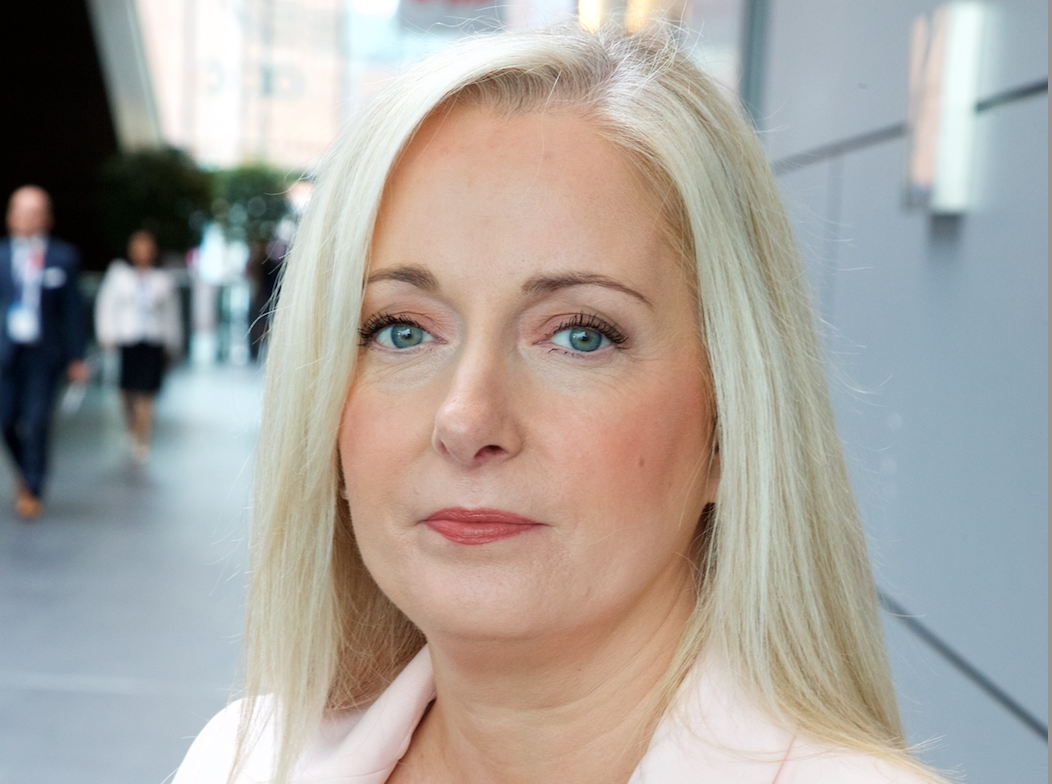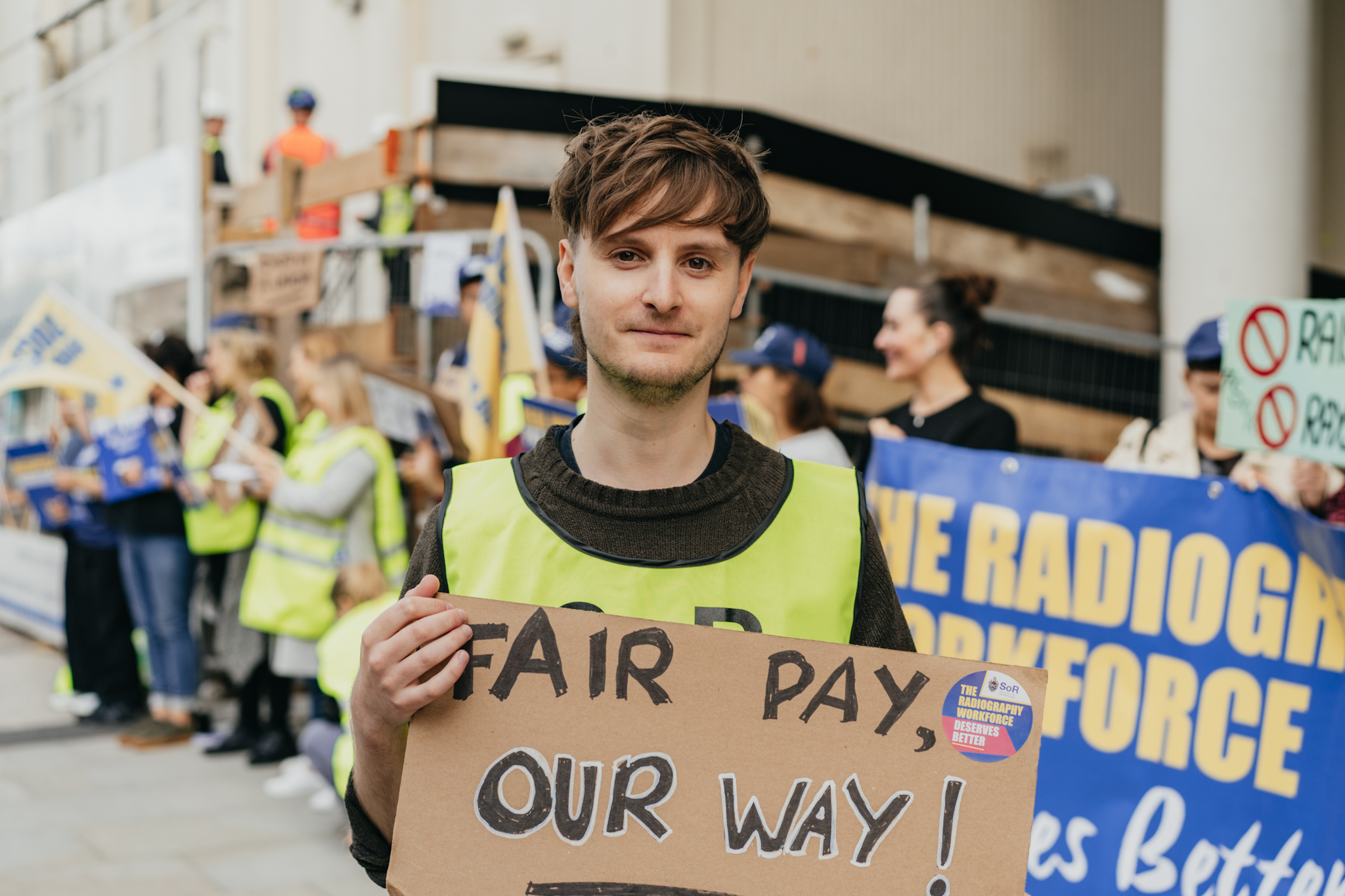Society Vice-President Katie Thompson addressed delegates at the TUC Congress in Liverpool on the need for pay restoration and enhancing public sector pay.
Speaking for the first time at TUC, Katie shared how the under-investment in pay is impacting patient services everyday. The failure to invest in radiography staff to meet the current and known future demand, has created waiting lists that mean people are suffering for longer and dying unnecessarily because there are insufficient staff to diagnose and treat them.
Motion 51 | TUC 2023
"Since 2008 pay awards in the public sector have been below inflation and average pay.
This has caused a 21% gap between national average earnings and the NHS, this is not isolated to the NHS the same story is seen in education, prison and probation services, local authorities and other public workers. Pay awards have not followed inflation this has been highlighted this year with an award of 5% in England whilst inflation was over 10%.
Real pay growth is the measure of total pay vs inflation the Office for national statistics (ONS) use CPIH ( Consumer Prices Index including owner occupiers’ housing costs) as the measure for inflation. CPIH has shown that from 2008 to today inflation has risen by 41.2%. Average weekly earnings have stayed above this at 48% for regular pay and 55% for total pay. The figures in the NHS are very different with the exception of band 1 which is now obsolete all other bands have had cumulative pay awards less than the 41.2% with the most senior staff being the worst affected with a rise of pay since 2008 of approximately 20% that is 50% lower than CPIH.
We need a commitment from our government to restoring our pay to make up for the losses of the last 25 years, an index linked Pay Restoration Guarantee for public sector workers.
What would this achieve? It would help with recruitment into these services. In radiography we have a vacancy rate of 10% and in some areas and as much as 1 in 5.
Radiographers train for three years to achieve a degree and enter the AFC (agenda for change) scale at a band 5 they enter the profession with large debt due to university fees and cost of living loans. Theses vacancies are having a direct affect on the workload, morale and general burnout of staff, with many leaving to change careers or work for private agencies where wages can be 2-3 times higher than in the NHS.
I am a sonographer qualified for almost 30 years if I worked for an agency I could earn up to £100 an hour that is almost 4 times my hourly rate working in the NHS.
High vacancy rates also effect patient care, waiting times can be detrimental to a patient’s diagnosis and ultimately treatment when scanners can not be staffed. As we are aware waiting lists are at an all time high with one million people waiting for an appointment with a radiography professional.
Our members regularly work over and above their contracted hours to try to elevate the waiting lists to accelerate the diagnosis and treatment of their patients. With pay not keeping up with the cost of living, leaving the profession is becoming a more attractive option. Our members have told us that they are finding it harder to make ends meet with rising food, energy, mortgage and nursery bills and not having the choice to take their families away in the summer holidays.
The current pay offer does not address the real time loss people are feeling when receiving their pay packets it does not stretch far enough, it does not cover the bills. There is no recognition or reward for the staff that have have worked hard to achieve their professional qualifications and they want to provide the best care for their patients. This is becoming more difficult due to high vacancies and ultimately safe staffing levels are becoming a luxury that many departments can not provide.
This disregard for NHS staff by government was made clear with the exclusion of bank staff workers receiving the lump sum one off awards, these are the back bone of filling our vacant shifts without having to rely on costly agency. The government say they are committed to promoting community diagnostic centres, reducing waiting lists and cancer wait times, but refuse to address the workforce crisis. None of their priorities are achievable without a workforce, more of these services are being contracted to the private sector.
We need a long term workforce plan which addresses the recruitment and retention issues. An attractive starting salary would aid recruitment working towards restoring pay levels for current staff starting with the 24/25 pay award. Our NHS cannot survive if we do not have action on these major issues.
The Society of Radiographers (SoR) took industrial action in July this year, to highlight the workforce crisis and the lack of restorative pay, it also showcased the passion that we have for our NHS, our patients and frustration with the lack of engagement of the government who seem determined to bury their heads in the sand. We have pride in who we are and what we do, we all deserve better, we all deserve respect and we all deserve to be rewarded for the work we do.
After the results of the recent ballot of our Northern Ireland members are to strike on the 20th and 21st of this month and following a very disappointing meeting with government to resolve our current pay dispute, England will follow on the 3rd of October to stand alongside our junior doctors and consultants to stand up for our workforce, our patients and our NHS."
Related News
 Trade Union & IR
Trade Union & IRBALLOT RESULT: Members in NI vote for strike action
48 hours of strike action planned for every Trust in Northern Ireland after 90% of respond...
 Trade Union & IR
Trade Union & IR'The Government gives us no choice but to strike again'
24 hour strike action planned for 37 Trusts in England following unsuccessful talks with G...
